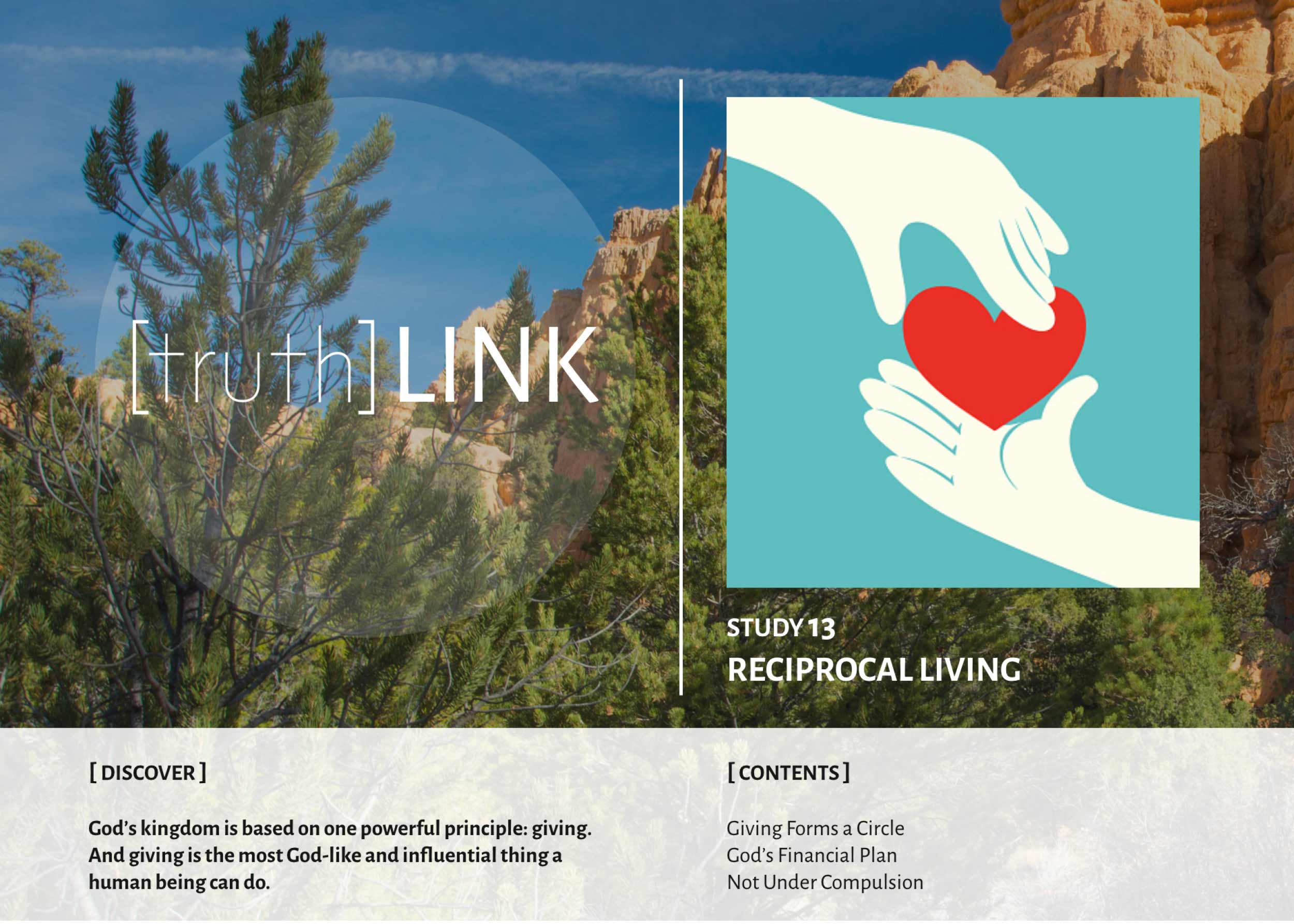
Giving Forms a Circle
It is literally true, with no exaggeration, that all the suffering and pain in the world is the result of people taking: emotional taking, relational taking, material taking. In God’s system there is no room for taking, but only for giving and receiving. Jesus explained in beautiful language that giving forms a circle of blessing:
“____________, and it will be ____________ to you: good measure, pressed down, shaken together, and running over will be put into your bosom. For with the same measure that you use, it will be measured back to you” (Luke 6:38).
Jesus is here describing the reciprocal nature of love: it moves outward toward others, then returns from others who also move outward. Those who give, receive, only to turn around and give more, and receive again. We might call this the circuit of benevolence. The circle begins with God as the Great Giver:
“Every good gift and every perfect _______ is from above, and comes down ________ _____ ____________ of lights, with whom there is no variation or shadow of turning” (James 1:17).
God’s giving nature led Him to give us the ultimate gift:

“For there is one God and one Mediator between God and men, the Man Christ Jesus, who ________ ____________ a ransom for all” (1 Timothy 2:5-6).
What does the gift of Jesus Christ indicate God is also willing to give us? Romans 8:32
But that’s not the end of the story. God’s goal is to replicate His giving character in our very lives. His giving to us seeks to generate giving in us and from us to others. To discover this truth, read and discuss the beautiful implications of Philippians 2:1-6. God’s giving initiates change in the way we do life in relation to others.
Paul says Jesus “gave Himself for us, that He might redeem us from every lawless deed and purify for Himself His own special people, zealous for good works” (Titus 2:14). Since God’s law is love (Romans 13:10), to be redeemed from “every lawless deed” means that we are delivered from every loveless deed. In other words, the plan of salvation transforms us from takers into givers. With slightly different language Paul said the same thing to the Galatians.
“Grace to you and peace from God the Father and our Lord Jesus Christ, who _______ ____________ for our sins, that He might _____________ us from this present ________ ______, according to the will of our God and Father, to whom be glory forever and ever. Amen” (Galatians 1:3-5).
In another place Paul describes the principle “this present evil age” operates on:
“For men will be lovers of _____________, lovers of __________, boasters, proud, blasphemers, disobedient to parents, unthankful, unholy, unloving, unforgiving, slanderers, without self-control, brutal, despisers of good, traitors, headstrong, haughty, lovers of pleasure rather than lovers of God, having a form of godliness but denying its power” (2 Timothy 3:2-5).
It is all of this that Christ gave Himself to deliver us from. His giving aims to liberate us from self-centered living into other-centered living. He begins the circle and we complete it, empowered and motivated by His love. He takes the initiative to reach down into our hearts and lives, and we simply reach back up to Him in gratitude and appreciation.
Circle complete!
And what a beautiful circle it is!
God’s Financial Plan
Most of the economic plans of our world are based on getting and keeping. The goal is to acquire all I can and expend it on myself and for my personal increased profit. God’s economic plan is based on giving for the blessing of others, which in turn produces greater profits in our lives on a deeper level than mere material gain. God has set up an ingenious system of material benevolence that simultaneously provides financially for the advancement of the gospel and for the relief of human suffering, while teaching us the core principle of the gospel.
God’s economic plan begins with an accurate view of His position over all material things as the Great Giver and of our position as receivers and stewards.
To whom do all the material blessings of the world belong? Psalm 24:1 and Haggai 2:8
Who gives the ability to produce wealth? Deuteronomy 8:18
What is the word Jesus uses to describe our relation to the material blessings He gives us? Luke 12:42-44
When we give to God, and to others, what is actually happening? 1 Chronicles 29:14
What percentage of our increase does God claim is holy to Him? Genesis 28:22; Leviticus 27:30
What is the tithe to be used for? Numbers 18:21
What is the rather strong word that God uses to describe those who do not return tithe? Malachi 3:8-9
And yet, what is the even stronger promise to those who do return tithe? Malachi 3:10
In addition to the tithe, to what level would God have us to give of our financial means? Deuteronomy 16:17
The tithing system is a practical illustration of the gospel because it teaches us that God is the Great Giver of all good things, including the material blessings of life. By returning 10% of our income to the Lord we acknowledge that 100% of our income came from Him as a gift tobegin with. So, returning tithe is an act of faith in response to God’s grace. Beyond the tithe, it is our privilege to manifest God’s love to the world by giving all we possibly can to relieve and help and bless those in need.
Not Under Compulsion
The gospel is the good news of salvation by God’s grace, through faith, in Christ alone. In those who receive it, the gospel sets in motion an outflow of good works that go back to God and out to the world, works which are motivated by the love of God revealed to us in Christ (2 Corinthians 5:14). This is the essence of what the Bible calls the “new covenant,” which is obedience to God’s law of love from the inside out rather than obedience rendered with the hope of earning salvation in exchange for what we do. It is in the light of the gospel that the apostle Paul says this regarding the way we should view our finances:
“Remember this: Whoever sows sparingly will also reap sparingly, and whoever sows generously will also reap generously. Each of you should give what you have decided in your heart to give, not reluctantly or under compulsion, for God loves a cheerful giver. And God is able to bless you abundantly, so that in all things at all times, having all that you need, you will abound in every good work. As it is written: ‘They have freely scattered their gifts to the poor; their righteousness endures forever.’ Now he who supplies seed to the sower and bread for food will also supply and increase your store of seed and will enlarge the harvest of your righteousness” (2 Corinthians 9:6-10, NIV).
Reciprocal living is really the only sustainable way to live, and it’s the only way to live that brings fulfillment and joy. All of life operates on the principle of sowing and rearing, outflow and inflow, giving and receiving. Of course God is not interested at all in pressuring us or guilting us into giving. It’s not our money He’s after, but rather our hearts. He asks us to give for our development and elevation into His image as the Great Giver.
[CONNECT]
Returning tithes and offerings is not a religious form to be self-righteously complied with, but rather a tangible and practical means of reflecting God’s heart of love back to Him and to the world.
While Jesus clearly desired that all His followers would participate in the tithing system, He strongly rebuked self-righteousness in the practice of tithing and urged us to not neglect “the weightier matters of the law: justice and mercy and faith. These you ought to have done, without leaving the others undone” (Matthew 23:23). According to Jesus, to pay tithe as a religious practice while neglecting justice and mercy and faith, which are expressions of “the love of God” (Luke 11:42), is “hypocrisy”—mere pretense or acting.
The whole point of God’s economic system of tithes and offerings is ministry to people. We do not return tithe as a moral compliance to lift ourselves above the others with religious pride, but rather that our hearts, by giving, would be enlarged with love for humanity and that our material blessings would be used to bring the good news of God’s love to the world through preaching, justice work, rescue missions, medical ministry, and numerous other ways of ministering God’s grace to men, women, and children.
[EXPERIENCE]
I want to step out in faith and become a participant in God’s economic plan by returning tithes and offerings.
What an incredible realization it is that all the material blessings I have are gifts from God! “For all things come from You, and of Your own we have given You” (1 Chronicles 29:14). By God’s grace, may my heart and life be constantly engaged in the beautiful circle of benevolence He has initiated.
Phone 1300 300 389























